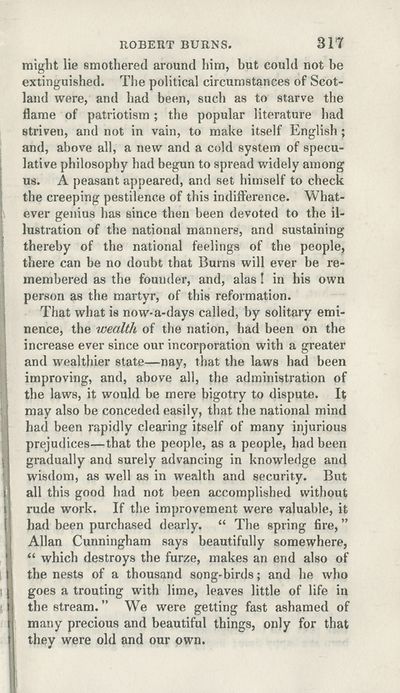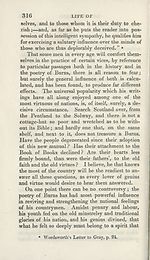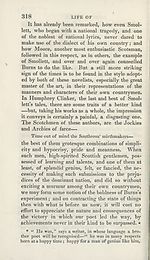Scotland/Scots > Life of Robert Burns
(327)
Download files
Complete book:
Individual page:
Thumbnail gallery: Grid view | List view

ROBERT BURNS.
317
might lie smothered around him, hut could not be
extinguished. The political circumstances of Scot¬
land were, and had been, such as to starve the
flame of patriotism ; the popular literature had
striven, and not in vain, to make itself English ;
and, above all, a new and a cold system of specu¬
lative philosophy had begun to spread widely among
us. A peasant appeared, and set himself to check
the creeping pestilence of this indifference. What¬
ever genius has since then been devoted to the il¬
lustration of the national manners, and sustaining
thereby of the national feelings of the people,
there can be no doubt that Burns will ever be re¬
membered as the founder, and, alas! in his own
person as the martyr, of this reformation.
That what is now-a-days called, by solitary emi¬
nence, the wealth of the nation, had been on the
increase ever since our incorporation with a greater
and wealthier state—nay, that the laws had been
improving, and, above all, the administration of
the laws, it would be mere bigotry to dispute. It
may also be conceded easily, that the national mind
had been rapidly clearing itself of many injurious
prejudices—that the people, as a people, had been
gradually and surely advancing in knowledge and
wisdom, as well as in wealth and security. But
all this good had not been accomplished without
rude work. If the improvement were valuable, it
had been purchased dearly. “ The spring fire, ”
Allan Cunningham says beautifully somewhere,
“ which destroys the furze, makes an end also of
the nests of a thousand song-birds; and he who
goes a trouting with lime, leaves little of life in
the stream.” We were getting fast ashamed of
many precious and beautiful things, only for that
they were old and our own.
317
might lie smothered around him, hut could not be
extinguished. The political circumstances of Scot¬
land were, and had been, such as to starve the
flame of patriotism ; the popular literature had
striven, and not in vain, to make itself English ;
and, above all, a new and a cold system of specu¬
lative philosophy had begun to spread widely among
us. A peasant appeared, and set himself to check
the creeping pestilence of this indifference. What¬
ever genius has since then been devoted to the il¬
lustration of the national manners, and sustaining
thereby of the national feelings of the people,
there can be no doubt that Burns will ever be re¬
membered as the founder, and, alas! in his own
person as the martyr, of this reformation.
That what is now-a-days called, by solitary emi¬
nence, the wealth of the nation, had been on the
increase ever since our incorporation with a greater
and wealthier state—nay, that the laws had been
improving, and, above all, the administration of
the laws, it would be mere bigotry to dispute. It
may also be conceded easily, that the national mind
had been rapidly clearing itself of many injurious
prejudices—that the people, as a people, had been
gradually and surely advancing in knowledge and
wisdom, as well as in wealth and security. But
all this good had not been accomplished without
rude work. If the improvement were valuable, it
had been purchased dearly. “ The spring fire, ”
Allan Cunningham says beautifully somewhere,
“ which destroys the furze, makes an end also of
the nests of a thousand song-birds; and he who
goes a trouting with lime, leaves little of life in
the stream.” We were getting fast ashamed of
many precious and beautiful things, only for that
they were old and our own.
Set display mode to:
![]() Universal Viewer |
Universal Viewer | ![]() Mirador |
Large image | Transcription
Mirador |
Large image | Transcription
| Antiquarian books of Scotland > Scotland/Scots > Life of Robert Burns > (327) |
|---|
| Permanent URL | https://digital.nls.uk/108249783 |
|---|
| Description | Thousands of printed books from the Antiquarian Books of Scotland collection which dates from 1641 to the 1980s. The collection consists of 14,800 books which were published in Scotland or have a Scottish connection, e.g. through the author, printer or owner. Subjects covered include sport, education, diseases, adventure, occupations, Jacobites, politics and religion. Among the 29 languages represented are English, Gaelic, Italian, French, Russian and Swedish. |
|---|

